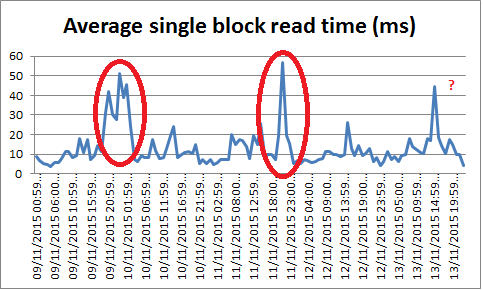Did it really fix it 2: Plan flip, unprofileable, baseline OFE round 2 and “stability”
November 16, 2015 Leave a comment
Snappy title, huh?
Aka: Why a sql plan baseline may be no guarantee of stability.
The other day, a problematic plan flip…
Tangent 1:
Cue much discussion about plan flips etc.
My thoughts on stability are that the priority for most application owners is stability and predictability but that does not tally with the defaul CBO behaviour and potentially you have to turn off a helluva lot to even get close.
Tangent 2:
I have commented before about the common sensitive of many databases to concurrent direct path reads (or rather the sensitivity is on the underlying SAN).
Here is one such illustration caused by this particular plan flip.
See that our single block read times go out from a “normal” range of 5 – 20ms to an average of 50+ ms. At this point anything doing physical IO starts to notice.
(Needless to say, I’m not a fan of these “normal” IO times – I think they’re awful but the SLA of the tier 2 (non flash) SAN storage is 20ms so we don’t alert until we breach that.)

Source:
select snap_id, begin_time, end_time, round(average,2) from dba_hist_sysmetric_summary where metric_name = 'Average Synchronous Single-Block Read Latency' order by snap_id;
Back to reality
Anyway, standard immediate-term fix for a plan flip is to hunt down a better plan from AWR and fix it with a profile or a baseline.
Not a problem to find one for this SQL as it nearly always executed with the same decent plan.
(AWR history is much longer than this but it gives the picture)
select to_char(trunc(sn.end_interval_time),'DD-MON-YYYY') dt
, st.sql_id
, st.plan_hash_value
, sum(rows_processed_delta) rws
, sum(executions_delta) execs
, round(sum(elapsed_time_delta)/1000/1000) elp
, round(sum(elapsed_time_delta)/1000/1000/nvl(nullif(sum(executions_delta),0),1),2) elpe
, round(sum(iowait_delta)/1000/1000) io
, round(sum(cpu_time_delta)/1000/1000) cpu
, sum(buffer_gets_delta) gets
, round(sum(disk_reads_delta)) disk_reads
from dba_hist_snapshot sn
, dba_hist_sqlstat st
where st.snap_id = sn.snap_id
and sn.instance_number = st.instance_number
and st.sql_id IN ('6xrx006fmqbq2')
group by trunc(sn.end_interval_time), st.sql_id, st.plan_hash_value
order by trunc(sn.end_interval_time) desc, elp desc;
DT SQL_ID PLAN_HASH_VALUE RWS EXECS ELP ELPE IO CPU GETS DISK_READS ----------- ------------- --------------- ---------- ---------- ---------- ---------- ---------- ---------- ---------- ---------- 10-NOV-2015 6xrx006fmqbq2 3871506300 5 1815 236211 130.14 226340 9993 757853211 745588219 09-NOV-2015 6xrx006fmqbq2 3871506300 1 1232 156412 126.96 149660 6846 507571690 499305166 09-NOV-2015 6xrx006fmqbq2 3803735407 53 6835 743 .11 3 723 190488567 41 07-NOV-2015 6xrx006fmqbq2 3803735407 31 3079 230 .07 3 218 37385043 56 06-NOV-2015 6xrx006fmqbq2 3803735407 166 18931 1200 .06 11 1128 180142678 484 05-NOV-2015 6xrx006fmqbq2 3803735407 305 9904 553 .06 5 508 75239139 93 04-NOV-2015 6xrx006fmqbq2 3803735407 160 18900 1089 .06 9 1027 150523728 204 03-NOV-2015 6xrx006fmqbq2 3803735407 226 12048 859 .07 58 794 154111239 424 02-NOV-2015 6xrx006fmqbq2 3803735407 1081 13327 1276 .1 66 1200 278129234 465
Problem plan is obvious, right?
Started during the day on the 9th, continued overnight until eventually noticed.
PHV 3871506300 does a FTS and gets direct path reads which causes our IO stress.
So, as mentioned, no problem, hint it with a sql profile via COE_XFR_SQL_PROFILE.sql (see Metalink note 215187.1)
But it didn’t work.
Not properly.
See top line.
DT SQL_ID PLAN_HASH_VALUE RWS EXECS ELP ELPE IO CPU GETS DISK_READS ----------- ------------- --------------- ---------- ---------- ---------- ---------- ---------- ---------- ---------- ---------- 10-NOV-2015 6xrx006fmqbq2 3353364157 20 4485 114084 25.44 4 111246 2907305774 216 10-NOV-2015 6xrx006fmqbq2 3871506300 5 1815 236211 130.14 226340 9993 757853211 745588219 09-NOV-2015 6xrx006fmqbq2 3871506300 1 1232 156412 126.96 149660 6846 507571690 499305166 09-NOV-2015 6xrx006fmqbq2 3803735407 53 6835 743 .11 3 723 190488567 41 07-NOV-2015 6xrx006fmqbq2 3803735407 31 3079 230 .07 3 218 37385043 56 06-NOV-2015 6xrx006fmqbq2 3803735407 166 18931 1200 .06 11 1128 180142678 484 05-NOV-2015 6xrx006fmqbq2 3803735407 305 9904 553 .06 5 508 75239139 93 04-NOV-2015 6xrx006fmqbq2 3803735407 160 18900 1089 .06 9 1027 150523728 204 03-NOV-2015 6xrx006fmqbq2 3803735407 226 12048 859 .07 58 794 154111239 424 02-NOV-2015 6xrx006fmqbq2 3803735407 1081 13327 1276 .1 66 1200 278129234 465
We didn’t get “good” plan PHV 3803735407, we avoided “nasty” plan PHV 3871506300 but we got not-quite-so-nasty-but-still-not-nice PHV 3353364157.
The SQL Profile was not able to reproduce the desired PHV.
But at least PHV was not doing the problematic direct path reads!
I took the hints from PHV 3803735407 via
select * from table(dbms_xplan.display_awr('6xrx006fmqbq2',3803735407,format=>'+OUTLINE'));
I double checked they matched the hints in the SQL Profile – they did.
I tried using the hints manually in a SQL statement and the result was consistent with the SQL Profile – PHV 3353364157.
At this point, the DBA suggested using a SQL Plan Baseline.
I resisted but eventually gave in.
Why would it make any difference?
When a plan cannot be reproduced then there are good reasons why a baseline is much, much safer than a profile.
A baseline must reproduce the desired PHV or it will be rejected completely.
A profile has no knowledge of PHV so it is possible that under certain circumstances the hints in a profile may be only partially applied.
Profile was dropped and baseline was created.
This was the immediate aftermath (top line)… Success!
And V$SQL was showing that the baseline was being used.
DT SQL_ID PLAN_HASH_VALUE RWS EXECS ELP ELPE IO CPU GETS DISK_READS ----------- ------------- --------------- ---------- ---------- ---------- ---------- ---------- ---------- ---------- ---------- 10-NOV-2015 6xrx006fmqbq2 3803735407 4 1866 120 .06 1 116 17401768 30 10-NOV-2015 6xrx006fmqbq2 3353364157 20 4485 114084 25.44 4 111246 2907305774 216 10-NOV-2015 6xrx006fmqbq2 3871506300 5 1815 236211 130.14 226340 9993 757853211 745588219 09-NOV-2015 6xrx006fmqbq2 3871506300 1 1232 156412 126.96 149660 6846 507571690 499305166 09-NOV-2015 6xrx006fmqbq2 3871506300 1 1232 156412 126.96 149660 6846 507571690 499305166 09-NOV-2015 6xrx006fmqbq2 3803735407 53 6835 743 .11 3 723 190488567 41 07-NOV-2015 6xrx006fmqbq2 3803735407 31 3079 230 .07 3 218 37385043 56 06-NOV-2015 6xrx006fmqbq2 3803735407 166 18931 1200 .06 11 1128 180142678 484 05-NOV-2015 6xrx006fmqbq2 3803735407 305 9904 553 .06 5 508 75239139 93 04-NOV-2015 6xrx006fmqbq2 3803735407 160 18900 1089 .06 9 1027 150523728 204 03-NOV-2015 6xrx006fmqbq2 3803735407 226 12048 859 .07 58 794 154111239 424 02-NOV-2015 6xrx006fmqbq2 3803735407 1081 13327 1276 .1 66 1200 278129234 465
I maintained that this didn’t make sense but the ticket was closed so I couldn’t get an SPM trace.
At this point a copy of the statement without profile and without baseline and without the manual fullset of hints was returning the original PHV 3803735407.
I went away that night and on the train I had a thought: “what if it wasn’t round 1 of the baseline which worked but round 2”.
Reminder of the baseline reproduction system
Round 2 is OFE only.
Doesn’t matter whether it is round 1 or round 2, if it’s reproduced it’s reproduced.
But if it was under OFE only then that was no guarantee of stability.
Then the following night, late night call, the baseline was no longer reproducing PHV 3803735407 but was back to the big problem PHV 3871506300!
Although I didn’t have an SPM trace, I’m adamant it verified my theory about it being round 2 only.
DT SQL_ID PLAN_HASH_VALUE RWS EXECS ELP ELPE IO CPU GETS DISK_READS ----------- ------------- --------------- ---------- ---------- ---------- ---------- ---------- ---------- ---------- ---------- 11-NOV-2015 6xrx006fmqbq2 3871506300 0 471 80513 170.94 77936 2543 193096137 188992511 11-NOV-2015 6xrx006fmqbq2 3803735407 212 9933 690 .07 14 586 97253038 154 10-NOV-2015 6xrx006fmqbq2 3803735407 4 1866 120 .06 1 116 17401768 30 10-NOV-2015 6xrx006fmqbq2 3353364157 20 4485 114084 25.44 4 111246 2907305774 216 10-NOV-2015 6xrx006fmqbq2 3871506300 5 1815 236211 130.14 226340 9993 757853211 745588219 09-NOV-2015 6xrx006fmqbq2 3871506300 1 1232 156412 126.96 149660 6846 507571690 499305166 09-NOV-2015 6xrx006fmqbq2 3871506300 1 1232 156412 126.96 149660 6846 507571690 499305166 09-NOV-2015 6xrx006fmqbq2 3803735407 53 6835 743 .11 3 723 190488567 41 07-NOV-2015 6xrx006fmqbq2 3803735407 31 3079 230 .07 3 218 37385043 56 06-NOV-2015 6xrx006fmqbq2 3803735407 166 18931 1200 .06 11 1128 180142678 484 05-NOV-2015 6xrx006fmqbq2 3803735407 305 9904 553 .06 5 508 75239139 93 04-NOV-2015 6xrx006fmqbq2 3803735407 160 18900 1089 .06 9 1027 150523728 204 03-NOV-2015 6xrx006fmqbq2 3803735407 226 12048 859 .07 58 794 154111239 424 02-NOV-2015 6xrx006fmqbq2 3803735407 1081 13327 1276 .1 66 1200 278129234 465
Note that at times of change, no database structures were being changed.
Stats will have been gathered, sure – that was the agent of change no doubt.
But no index maintenance was happening, nothing was going unusable, no partition maintenance was happening.
Nothing was changing which should mean that a particular plan was impossible.
This means that the set of hints for this particular plan was not deterministic or rather the hintset was surely incomplete in some way which mean that the optimizer was free to do certain transformations which meant that the hintset was then invalid? Not 100% sure, still to be looked at in more detail…
At this point we dropped the baseline and went with a cut-down sql profile which applied only two hints – to politely request index scans for the two problematic FTS in each of PHV 3871506300 and 3353364157.
And this worked and has been ok since (so far) but it will not be the longer term solution.
DT SQL_ID PLAN_HASH_VALUE RWS EXECS ELP ELPE IO CPU GETS DISK_READS ----------- ------------- --------------- ---------- ---------- ---------- ---------- ---------- ---------- ---------- ---------- 16-NOV-2015 6xrx006fmqbq2 3803735407 80 6887 348 .05 11 310 44574494 86 13-NOV-2015 6xrx006fmqbq2 3803735407 114 13054 842 .06 19 713 117260543 482 12-NOV-2015 6xrx006fmqbq2 3803735407 585 28074 1854 .07 12 1823 321890748 1983 11-NOV-2015 6xrx006fmqbq2 3871506300 0 471 80513 170.94 77936 2543 193096137 188992511 11-NOV-2015 6xrx006fmqbq2 3803735407 212 9933 690 .07 14 586 97253038 154 10-NOV-2015 6xrx006fmqbq2 3871506300 5 1815 236211 130.14 226340 9993 757853211 745588219 10-NOV-2015 6xrx006fmqbq2 3353364157 20 4485 114084 25.44 4 111246 2907305774 216 10-NOV-2015 6xrx006fmqbq2 3803735407 4 1866 120 .06 1 116 17401768 30 09-NOV-2015 6xrx006fmqbq2 3871506300 1 1232 156412 126.96 149660 6846 507571690 499305166 09-NOV-2015 6xrx006fmqbq2 3803735407 53 6835 743 .11 3 723 190488567 41 07-NOV-2015 6xrx006fmqbq2 3803735407 31 3079 230 .07 3 218 37385043 56 06-NOV-2015 6xrx006fmqbq2 3803735407 166 18931 1200 .06 11 1128 180142678 484 05-NOV-2015 6xrx006fmqbq2 3803735407 305 9904 553 .06 5 508 75239139 93 04-NOV-2015 6xrx006fmqbq2 3803735407 160 18900 1089 .06 9 1027 150523728 204 03-NOV-2015 6xrx006fmqbq2 3803735407 226 12048 859 .07 58 794 154111239 424 02-NOV-2015 6xrx006fmqbq2 3803735407 1081 13327 1276 .1 66 1200 278129234 465
Never before seen an execution plan which had quite this problem interacting with SPM.
A test case to get to the root of the problem is still on the TODO list.
Something to do with a statement involving a WITH subquery and NO_MERGE
e.g.
WITH x AS (SELECT /*+ no_merge...)
SELECT
FROM ...
WHERE EXISTS (SELECT
FROM x
...
WHERE...);


Recent Comments